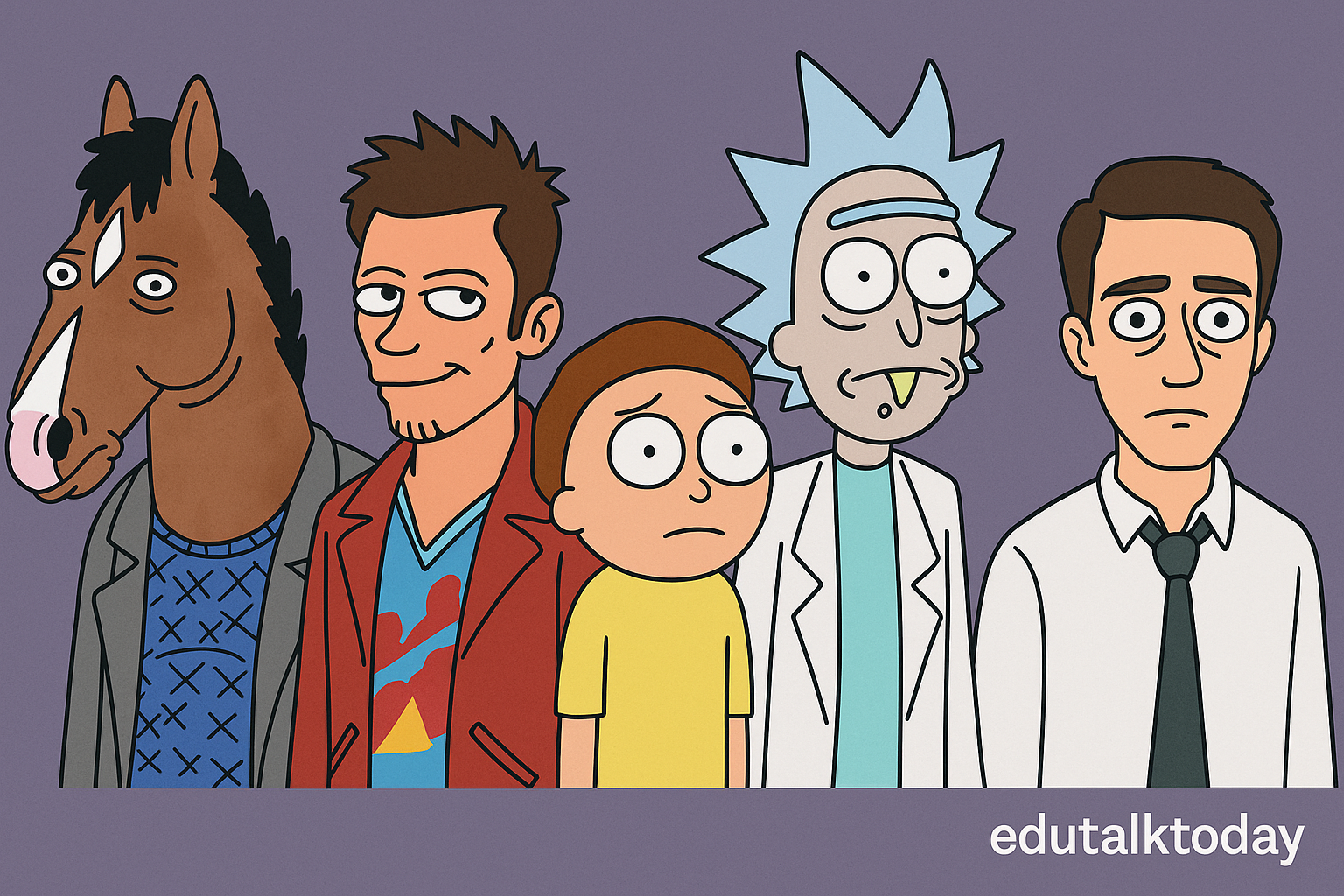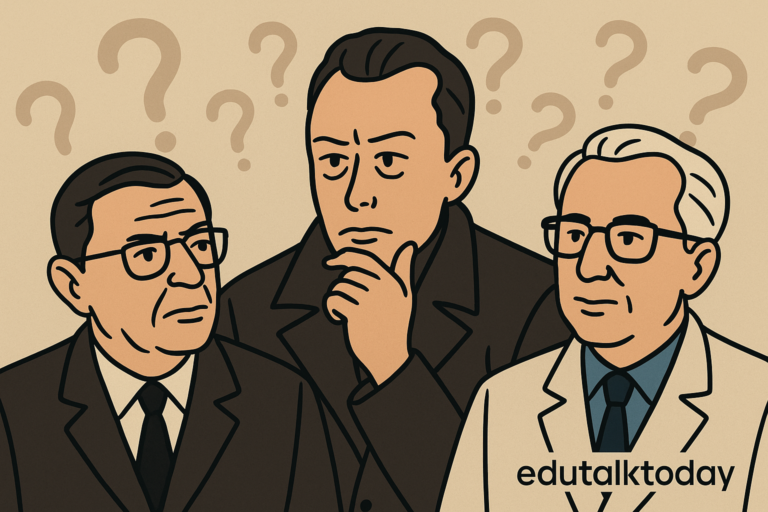Existentialism in Pop Culture (Fight Club to Rick and Morty)

Most of us didn’t first encounter existentialism through Kierkegaard or Heidegger.
We probably felt it in The Matrix, or BoJack Horseman, or during that unsettling moment in Rick and Morty when you realize nothing in the multiverse actually matters. Pop culture is doing something strange and fascinating: it’s not just echoing existential ideas—it’s living them out, often more vividly than philosophy textbooks ever could.
I’m not saying this to be contrarian.
I think it’s because pop culture, especially since the late 20th century, has become a kind of testing ground for modern subjectivity, where ideas like authenticity, absurdity, and freedom get worked out in real time.
And in a media-saturated, hyper-consumerist, post-truth world, how could existentialism not leak into our shows and movies?
So let’s start with one of the most obvious (and misunderstood) examples: Fight Club. It’s way more than just a middle finger to capitalism.
Fight Club Isn’t Just Anti-Consumer—It’s a Crisis of Being
You know how everyone thinks Fight Club is just about hating IKEA furniture? That’s the surface read.
But the deeper currents are so much richer—and way more existential. The film (and Chuck Palahniuk’s novel before it) is actually about the ontological breakdown of selfhood in a simulated world. And that’s not me reaching—that’s baked into every frame.
Let’s talk about the narrator first. He’s not just tired—he’s unmoored. He can’t sleep, can’t feel, and lives a life curated by catalogues. His apartment looks like a museum of choices made by someone else.
That’s bad faith, plain and simple—Sartre’s version. He’s performing a role (corporate drone, “responsible adult”) instead of choosing freely, authentically.
Enter Tyler Durden.
Now here’s where things get juicy.
Tyler isn’t just an alter ego—he’s the fantasy of radical existential freedom. He’s the Übermensch by way of Nietzsche, but filtered through late capitalist collapse. He destroys things not to watch them burn, but to clear space for authentic being.
That’s why the first rules of Fight Club aren’t just about secrecy—they’re about shedding identity. You’re not your job, you’re not your name. You’re not even your own body in the way you think you are.
Think about the soap. It’s made from liposuctioned human fat—literal recycled bodies, sold back to the rich.
That’s Baudrillard, right there: we’ve gone full simulacrum. And Tyler knows it.
That’s why the only “real” thing left is pain. Blood. Fistfights. The body’s resistance to abstraction becomes the one reliable truth.
But let’s not stop at surface rebellion. What makes Fight Club so fascinating existentially is that it dramatizes authenticity as violence—not in a macho sense, but in the Heideggerian one.
Think “Being-toward-death.” The narrator can only confront real existence when he’s on the edge: a gun in his mouth, a building about to collapse. These aren’t acts of nihilism—they’re attempts to force Being into awareness.
That last scene? “You met me at a very strange time in my life.” That’s not just a quirky sign-off. That’s Kierkegaard’s leap. It’s the moment when he’s finally himself—no more projections, no more avatars. He’s integrated. Tyler is gone. The buildings are falling.
And for the first time, there’s genuine presence.
Even Project Mayhem, as misguided as it is, follows the logic of Camus’s The Rebel. Rebellion, in Camus’s world, isn’t about destruction for its own sake. It’s about drawing a line—saying “this far, no further.” The men in Fight Club are trying (badly, violently) to make meaning in a meaningless world.
They’re reclaiming agency, even if they’re doing it in the dumbest, most dangerous ways possible.
Now, critics have rightly pointed out the film’s contradictions. It’s a product of the very culture it critiques.
It’s stylish, seductive, and became a brand. But that tension?
That’s the point.
Fight Club is existentialism inside the machine—gnawing at its own belly.
So when people say “Fight Club is just about rejecting consumerism,” I get it—but I also think they’re missing the core. The movie’s real obsession is with what’s left when all our false selves are stripped away. And it’s not pretty. But maybe it’s honest.
Next up: What happens when a cartoon decides to take the same questions and zoom out to infinity?
Yeah, we’re going there—Rick and Morty.
Rick and Morty – What If the Absurd Was a Running Joke?
So, what happens when you take all the classic existential questions—meaning, agency, the absurd—and toss them into a cartoon filled with fart jokes, interdimensional cable, and nihilistic rants?
You get Rick and Morty, one of the weirdest and most philosophically loaded shows of the past decade.
I mean, it’s practically Camus with lasers. But here’s the kicker: unlike Fight Club, which dramatizes existential awakening in a grimy, hyper-real world, Rick and Morty cranks up the absurd to galactic proportions—and then laughs at it.
Let’s start with Rick himself. On the surface, he’s the smartest man in the universe. He can bend physics, travel across timelines, clone himself, destroy planets. And yet—he’s absolutely miserable.
This isn’t a bug; it’s the show’s central point. Rick is the ultimate embodiment of the postmodern existential crisis: he knows too much, can do anything, and has concluded that nothing matters.
But here’s where it gets really existential—this isn’t played for tragedy, at least not consistently. The show frames Rick’s despair as both horrifying and hilarious. One moment he’s attempting suicide while drunk, and the next he’s turning himself into a pickle to avoid family therapy.
(“Pickle Rick” isn’t just meme material—it’s a metaphor for the absurd hero literally choosing transformation over confrontation.)
Now, here’s the distinction that matters: Rick and Morty isn’t nihilist. It’s post-nihilist. It takes the conclusion “nothing matters” and treats it not as the end of the conversation, but the start. It’s Camus’s absurdism repackaged for a fragmented audience. Morty is our Sisyphus—dragged along episode after episode, gaining self-awareness only to have it crushed, yet continuing anyway.
Let’s break this down:
1. Cosmic Insignificance:
The multiverse in Rick and Morty does more than expand plot possibilities—it annihilates essentialism. Every identity is replicable, every reality disposable. You die in one timeline? Just switch to another. That sounds freeing, but the result is pure existential vertigo. If there’s always another version of you, what anchors your choices?
2. Rick’s Broken Ethics:
Rick is a godlike figure who consistently refuses moral responsibility. But is that true freedom? Or is it just the fear of commitment dressed up as cynicism? That’s very Dostoevsky—freedom as both salvation and curse. Rick might be beyond good and evil, but he’s also adrift without meaning. That’s not power. That’s paralysis.
3. The Family as Existential Theater:
The Smith family is a mess—but they’re also the show’s ethical center. Summer, Beth, Jerry, even Morty—they all fumble through relationships, trying to make meaning out of daily life. They’re the ones wrestling with Kierkegaard’s “leap of faith”—clinging to connection in a disconnected universe. And unlike Rick, sometimes they choose to believe.
4. Metafictional Absurdity:
The show constantly breaks the fourth wall, mocking its own structure. But that’s not just comedy—it’s existential recursion. In “Never Ricking Morty”, characters realize they’re in a narrative loop, desperately trying to assert control. It’s Sartre’s No Exit meets Black Mirror meets a joke about trains. And again—it’s about freedom, but without clarity.
What’s genius about Rick and Morty is that it refuses clean answers. Rick can go full monologue about the meaningless of life—and then risk everything for his daughter.
He hates love but keeps clinging to it. He believes nothing matters and yet acts like it does. And that contradiction is existential gold.
This show isn’t asking, “What’s the meaning of life?” It’s asking, “If life has no inherent meaning, what do you do next?”
And its answer, unlike some of the darker works we’ve seen, is: You laugh, you love, you screw up, and you keep going. Maybe not because it matters—but because you chose to.
In short, Rick and Morty sneaks existentialism into the mainstream through parody and play, turning its characters into tragicomic philosophers. And somehow, it works.
More Existential Pop Culture
Okay, so we’ve covered Fight Club and Rick and Morty—two heavy-hitters in the pop culture existential pantheon. But the truth is, existentialism has quietly infiltrated way more shows, films, and books than we usually give it credit for. And in some of these, the themes aren’t shouted—they’re whispered. Let’s break it down.
TV That Hurts So Good:
- BoJack Horseman
On paper: a depressed, washed-up actor who’s also a horse. In practice: the best contemporary exploration of Kierkegaardian despair on television. BoJack isn’t just sad—he’s torn between wanting to be a good person and believing he never can be. He sabotages himself constantly, like he’s allergic to redemption. That’s not nihilism. That’s existential guilt in its rawest form. - The Leftovers
2% of the world vanishes, and everyone left behind has to cope. But this isn’t sci-fi—it’s absurdism. The world refuses to explain itself, and every attempt to force meaning onto it fails. Characters join cults, isolate themselves, fall in love, and try to live anyway. Sound familiar? It’s basically Camus’s The Plague, just with better lighting. - Mr. Robot
Elliot’s struggle with reality, surveillance, and control maps perfectly onto Sartre’s idea of radical freedom under oppressive systems. He’s constantly split—morally, psychologically—and the show plays with perception to show how hard it is to act freely when nothing feels real. Technological solipsism meets philosophical alienation.
Films That Go Full Existential:
- Synecdoche, New York
Caden Cotard builds a replica of New York inside a warehouse to stage his own life. It’s a film about life as performance—pure existential dread. He’s trying to control meaning, but the deeper he goes, the less he understands. This is Heidegger’s anxiety, embodied. - Eternal Sunshine of the Spotless Mind
What if you could erase pain—but lose love with it? That’s the core existential tension. Joel and Clementine’s relationship is a case study in facticity vs. transcendence. They are who they are because of the pain. Removing it doesn’t make them free—it makes them strangers. - Her
An AI romance? Sure. But what it’s really about is the fragility of identity in a hyper-digital world. Theodore doesn’t just fall in love—he dissolves into connection, only to find that even his most intimate experiences are shared with thousands of others. That’s existential loneliness in the age of cloud computing.
Books That Quietly Gut You:
- House of Leaves (Mark Z. Danielewski)
A house that’s bigger on the inside than the outside becomes a metaphor for ontological instability. Characters descend into obsession, trying to map a space that resists logic. The book itself resists linear reading. It’s a textual maze about being. - The Road (Cormac McCarthy)
A father and son wander through a ruined world. There’s no hope of salvation—only love, memory, and survival. It’s the existential bare minimum: even when everything else dies, the choice to care remains. - Never Let Me Go (Kazuo Ishiguro)
Clones raised to donate their organs, yet they fall in love, make art, dream. The tragedy isn’t their fate—it’s that they still believe they might escape it. They’re fully human in every way that matters, and yet they can’t change the system. It’s quiet, devastating existential horror.
Final Thoughts
Pop culture isn’t dumbing down existentialism—it’s stress-testing it.
These stories are where abstract ideas get messy, emotional, contradictory—just like real life. We see people (and horses, clones, cartoons) facing the void, sometimes laughing, sometimes screaming, but always choosing something in the face of nothing.
And maybe that’s what existentialism really looks like now: not just in books and lecture halls, but in living rooms, memes, and late-night binges. Because let’s face it—if nothing matters, what we choose to care about might matter more than ever.





